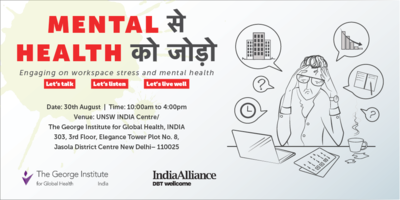
Mental health at workplace
Mental health in the workplace is the theme of World Mental Health Day 2017. World Mental Health Day is observed on 10 October every year, with the overall objective of raising awareness of mental health issues and mobilizing efforts in support of better mental health.
Stress at workplace is one of the many risk factors for mental health problems, but never thought of or discussed. Research shows that when employees feel meaningful, valued motivated, supported they tend to have better mental well-being.
Organizations can have financial benefits, increased productivity, reduced sick pay or fewer legal claims from looking after the mental well-being of employees. But more importantly and fundamentally it is about doing the right thing- the moral and societal imperatives come first.
The World Health Organization (WHO) defines workplace stress as “The response people may have when presented with work demands and pressures that are not matched to their knowledge and abilities and which challenge their ability to cope,” and further elaborated that it can be caused “by poor work organisation (the way we design jobs and work systems, and the way we manage them), by poor work design (for example, lack of control over work processes), poor management, unsatisfactory working conditions, and lack of support from colleagues and supervisors. Below are some common causes of workplace stress:
- Unmanageable workload/ Long hours of work and no break
- Unrealistic expectations/ deadlines
- Overly pressurized work environment/ Lack of control
- Unable to avail leaves/ Working when ill
- Difficult interpersonal relationships/ Difficult people at work
- Job insecurity or poorly managed change
- Unhealthy office environment and office space
The cause or reason of stress itself is not harmful, but experiencing stress and your response to stress can have a significant impact on your health.
As per a study conducted across 35 countries, including India, two-third employees who suffered depression either faced discrimination at work or while applying for jobs. These perceived and anticipated discrimination can be categorized as the major causes for people suffering silently at workplaces and being hesitant to seek proper care and counselling. Alongside this, sexual harassment and bullying at the workplace is another serious matter of concern which contributes to stress among the employees. Mental health and well being also affects work in a number of ways, it may result in:
- Giving up - not trying to make a difference
- Social withdrawal
- Passivity
- Decreased effectiveness at work
- Decreased problem-solving ability
- Procrastination
- Frustration
- Low self-esteem
Work stress can lead to serious anxiety problems, depression and panic attacks if not addresses for too long.
Dr Pallab Maulik, Deputy Director, The George Institute for Global Health, says;
"Organisations need to be made aware of the basic reasons behind the mental health issue among employees. They need to encourage staff to maintain a good work-life balance and should take active measures to ensure that the workplace is a safe and secure place for all employees. Moreover, in case an employee is suffering from certain mental health issues, the organisation should support and encourage them to seek appropriate mental health care and counselling. It should also create a healthy environment where employees are comfortable discussing their issues with appropriate staff within the organisation so that issues can be identified early and severe mental health issues can be avoided."
Evidence shows that no single intervention can work in isolation and it is recommended to have a group of interventions, which are available for those in need. Interventions like promoting physical activity, cognitive behaviour therapy and stress management have shown a positive impact in mitigating mental health issues among employees. Workplace screening for mental disorders followed by access to basic mental health services has been found to be effective but could lead to a potential increase in anxiety levels in those who are screened as false positives, so routine screening at workplace is not recommended. Below are some more suggestions to improve mental health at work:
- Awareness around mental health and well being
- Involving staff in dialogue and decision making
- Culture of openness
- Two-way communication
- Work/life balance
- Learning and Development
- Peer support, buddy system and mentoring
- Positive working relationships and social activities
Dr Pallab Maulik, says;
"Revealing details about treatment are not mandatory and no organization can ask for such. However, if sick leaves are availed then a doctor’s certificate may be necessary. As long as an employee is performing, an organization should have no problems about the reason for one’s illness and any such details should be treated with the strictest confidence. If the organization is supportive, then the employee can also speak to the HR and seek any support available through the organization."
If you feel that are suffering from certain mental health issues, you should seek treatment from a professional.







